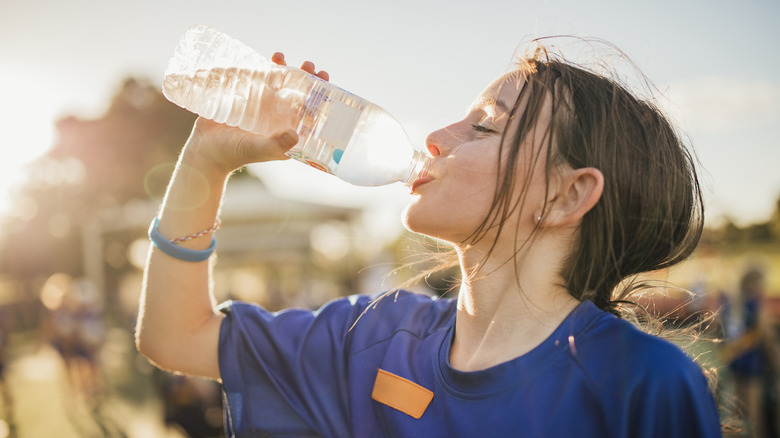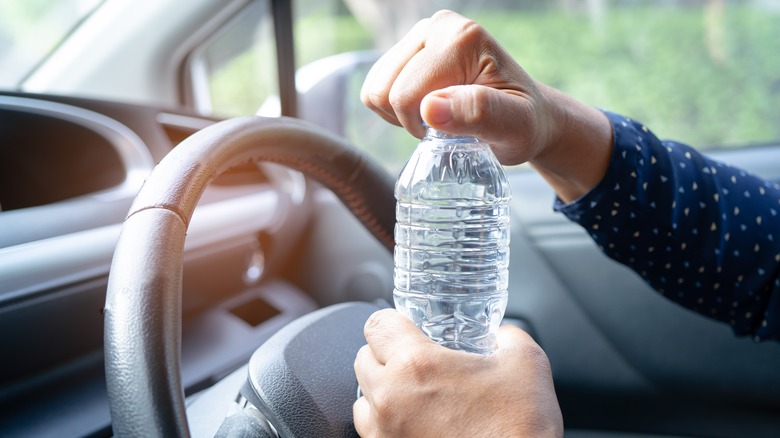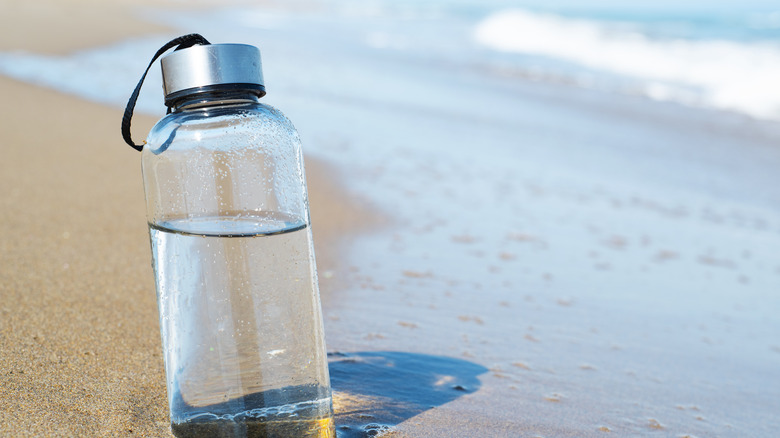The Trouble With Plastic Water Bottles In The Summertime
Some of us wait many frigid months for that glorious summer sun to arrive — and all the fun that comes with it. From picnics to barbecues, ballgames to boating, those vitamin D3-packed rays can bring happy moods and even a possibly boosted immune system, according to the CDC. Yet, too much sun (and sweating) can also lead to dehydration, which is where drinking water becomes important.
The hard part is, you can't always count on a water fountain being accessible, or providing the quality you can get from clean, filtered, bottled water. So, toting your own in those easily accessible bottles is often the way to go — but there's something that's important to know about staying hydrated this way, particularly in the summertime.
When heat levels rise throughout the day and evening, those handy plastic water bottles can become problematic. This isn't exactly about environmental issues (though that's certainly an issue, too), but rather the immediate concern has more to do with your personal health. Prolonged exposure of plastic bottles to hot sun (whether outside at the park or even inside a hot car) may cause the release of unhealthy chemicals into your water.
Avoid leaving plastic water bottles in a hot car
Many people often keep a supply of bottled water in the trunk or floorboard of their vehicles, which might seem like a great idea since water will always be instantly available for hydration needs. But, if the bottles are made from plastic, it can be an issue in the summer when the heat warms them up.
Depending on the type and quality of the bottle, heat will cause the plastic to deteriorate, possibly contaminating your water with chemicals such as bisphenol A (BPA). This chemical, along with others, can have significant negative impacts on human health, explains the Journal of Water & Health. Even manufacturers who proactively avoid BPA in plastic drinking bottles often still include phthalates, which also have harmful effects.
Bottles marked as PET, indicating a durable 100% recyclable type of plastic, are also vulnerable to the effect of extreme heat. PET bottles can release an over-abundance of phthalates at temperatures as low as 86 degrees Fahrenheit, as well as releasing dangerous antimony compounds at just 140 degrees. Antimonies are known to negatively affect the heart, stomach, lungs, and more, notes the CDC.
Prolonged heat also escalates the potential for bacteria to multiply inside plastic containers. Saliva carries bacteria, so when you take a swig of water, reseal, and leave it in a hot car, it creates an ideal environment for bacteria to multiply and flourish. Additional sips from the bottle can send that bacteria flowing into your system.
Other options that may be safer than plastic bottles
If you're wondering how hot a car can actually get, consider this: A normal summertime day measuring 85 degrees Fahrenheit can heat a vehicle interior to 104 degrees in just 10 minutes, and a sweltering 119 degrees after 30 minutes, according to researchers at Stanford. That doesn't mean the chemicals in plastic water bottles will break down that quickly. It's the prolonged exposure that creates the dilemma, so if possible, avoid leaving the bottles in a hot car for more than two hours. It's also best to toss out a plastic water bottle after exposure of 12 hours or more.
Carrying around your own water is still an excellent idea, one that can greatly improve your health, comfort, and hydration needs during the long, hot days of summer. But, there may be better options than plastic bottles. A simple solution: Switch to glass bottles, which are refillable, constructed from natural materials, and, most importantly, they don't leach chemicals into your water. Or, you can try boxed water for another alternative that is also safer than plastic bottles.



